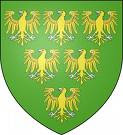My father is deceas'd. Come, Gaveston,
And share the kingdom with thy dearest friend.
Ah, words that make me surfeit with delight!
What greater bliss can hap to Gaveston
Than live and be the favourite of a king!
Sweet prince, I come! these, thy amorous lines
Might have enforc'd me to have swum “from France,
And, like Leander, gasp'd upon the sand,
So thou wouldst smile, and take me in thine arms.
The sight of London to my exil'd eyes
Is as Elysium to a new-come soul:
Not that I love the city or the men,
But that it harbours him I hold so dear,—
The king, upon whose bosom let me lie,
And with the world be still at enmity.
What need the arctic people love star-light,
To whom the sun shines both by day and night?
Farewell base stooping to the lordly peers!
My knee shall bow to none but to the king.
As for the multitude, that are but sparks,
Rak'd up in embers of their poverty,—
Tanti,—I'll fawn first on the wind,
That glanceth at my lips, and flieth away.
The official title of Christopher Marlowe's play about Edward II was 'The Troublesome reign and Lamentable Death of Edward II, King of England, and the Tragical Fall of Proud Mortimer'. It was first published in 1594. I have been fortunate to see a couple of productions, set in the period of the time and modern day. The opening speech sets the tone of the whole play. Piers Gaveston has been banished by Edward's father, Edward Ist, and the play opens with his death and Piers receiving a letter from a besotted Edward, now King. It is true that one of Edward II's first acts on becoming king was to recall Piers. The relationship between Edward and Piers is made obvious from this opening speech, with Piers referring to himself as Leander. Leander was a classical character from Greek mythology, who fell in love with Hero, a priestess of Aphrodite. To meet with her in secret, Leander would have to swim to her. Clearly, Piers sees himself returning to London to meet with his lover, Edward. His intention is also to never bow and scrape to anyone else at court - and to be a thorn in their side and lead the king astray with his love of finery and frivolous activities such as poetry, music and masques.
To read an excellent critique of the play, click here


